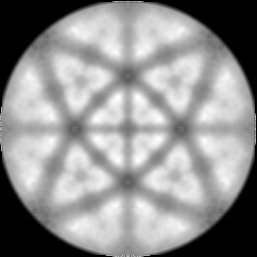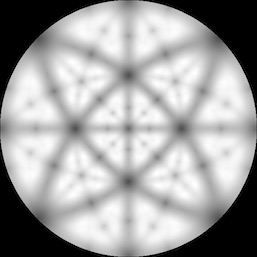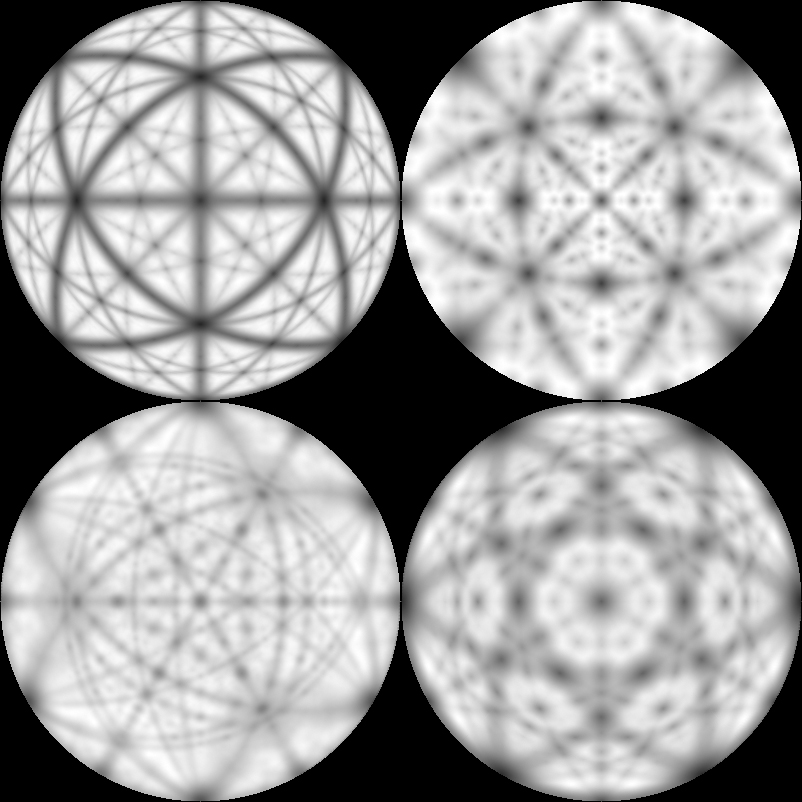-
Notifications
You must be signed in to change notification settings - Fork 13
Ion induced Secondary Electron Master Pattern
This program generates a master pattern for the ion-induced secondary electron imaging modality. The code uses an algorithm based on the iCHORD algorithm described in the following paper:
https://doi.org/10.1016/j.ultramic.2019.03.007
The reason for developing this program goes back to a well known IN100 serial sectioning data set acquired by M. Uchic and colleagues at the Air Force Research Laboratory in Dayton OH around 2004. For each slice there is an EBSD orientation map as well as four ion-induced secondary electron (ISE) images at different sample tilt angles. Thus, for each image pixel there are four different intensity values that can be related to orientations. Back-projecting these intensities onto a stereographic projection and smoothing somewhat, the following projection is obtained (IN100 is a nickel-based polycrystalline superalloy, so the structure is fcc):


The EMISEmaster program can be used to compute such a projection for an arbitrary crystal structure; the simulated pattern for Ni is shown on the right above.
The program is executed by typing EMISEmaster -t on the command line. This will generate an EMISEmaster.template file in the current folder; rename the file with an extension .nml and then edit the parameter values:
&ISEmastervars
! crystal structure file
xtalname = 'undefined',
! number of pixels along x-direction of the square master pattern (2*npx+1 = total number)
npx = 500,
! intensity scaling parameters
iscale = 2.0 0.05 2.5,
! multiplier to set the projection sphere radius
multiplier = 1.75,
! number of OpenMP threads (0 to use the maximum available)
nthreads = 1,
! this file will also contain the output data of the master program
outname = 'undefined',
! name (without extension) of the tiff output file for the Northern Hemisphere
tiffname = 'undefined',
/The default scaling parameters iscale are the values used for the simulation above.
- iscale(1) multiplies the power of the distance to the projection plane which is converted to brightness value;
- iscale(2) sets the power of the distance;
- iscale(3) scales the atomic radii from the standard metallic radii table used in EMsoftOO.
The multiplier parameter scales the radius of the projection sphere defined in the iCHORD paper. The other parameters are readily interpreted.
This computation can be carried out for arbitrary crystal symmetry. The examples below are (from top left clockwise): Al3Hf (DO22 structure); GaAs (cubic); Zn (hexagonal); and Lizardite-1T (trigonal).

Wiki pages are maintained by M. De Graef; they are part of the EMsoftOO package and fall under the same copyright (BSD2).
Information for Users
SEM Modalities
- Monte Carlo Simulations- EBSD Master Pattern Simulations
- EBSD Depth Master Pattern Simulations
- TKD Master Pattern Simulations
- ECP Master Pattern Simulations
- Overlap Master Patterns
- EBSD Pattern Simulations
- ECP Pattern Simulations
- TKD Pattern Simulations
- Dictionary Indexing
- EBSD Spherical Indexing
- EBSD Reflector Ranking
- Ion-induced Secondary Electron Master Pattern
- ECCI Defect Image Simulations
- 4DEBSD
TEM Modalities
- HH4- PED
- CBED Pattern Simulations
- STEM-DCI Image Simulations
- EMIntegrateSTEM utility
Utility Programs
- EMConvertOrientations- EMDisorientations
- EMHOLZ
- EMKikuchiMap
- EMOpenCLinfo
- EMZAgeom
- EMcuboMK
- EMdpextract
- EMdpmerge
- EMdrawcell
- EMeqvPS
- EMeqvrot
- EMfamily
- EMGBO
- EMGBOdm
- EMgetEulers
- EMgetOSM
- EMlatgeom
- EMlistSG
- EMlistTC
- EMmkxtal
- EMorbit
- EMorav
- EMorient
- EMqg
- EMsampleRFZ
- EMshowxtal
- EMsoftSlackTest
- EMsoftinit
- EMstar
- EMstereo
- EMxtalExtract
- EMxtalinfo
- EMzap
Complete Examples
- Crystal Data Entry Example
- EBSD Example
- ECP Example
- TKD Example
- ECCI Example
- CBED Example
- Dictionary Indexing Example
- DItutorial
Information for Developers